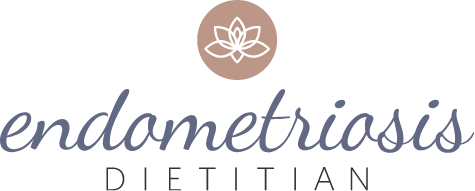3 Key Components of a Diet for Endometriosis and Fertility
Are you trying to conceive with endometriosis? Dealing with infertility is a harsh reality for many endo sufferers, as 30-50% of people with endometriosis may experience infertility. But don’t lose hope! There’s a light at the end of the tunnel for many, and a diet for endometriosis and fertility can help.
Keep in mind that what works for some might not work for others. Each person is unique in what will work best for their body. The idea is to try different recommendations, including specific foods and vitamins for endometriosis and fertility to see which ones benefit your specific needs.
As a registered dietitian (who also has endometriosis!) I’ve researched, studied, and trialed all of the diets under the sun. Here you’ll find a list of suggestions for adjusting your diet to promote fertility as you navigate trying to conceive with endo.
Before we get into the nutrition guide, let’s go over what may be going on in our bodies when you have endometriosis that affects fertility.
How Does Endometriosis Affect Fertility?
One of the first things to make very clear here is that while many women do experience infertility with endo, it’s NOT the case for everyone! But if you’ve been trying for months (or years!) with no luck, you might wonder why this is happening.
When we look at endometriosis, there are a few reasons it can cause fertility issues:
Endometrial-like tissue implants: endo growths around the fallopian tubes or ovaries can cause inflammation and scar tissue, possibly leading to blocked tubes or scarred ovaries.
Hormonal imbalance: hormones can decline too quickly or not increase fast enough in important parts of the female cycle, resulting in losses, poor implantation or infertility. Some hormones to consider include testosterone (when low), DHEA (when low), progesterone (when low), high prolactin, or low preovulatory estrogen levels.
Inflammation: systemic or localized inflammation because of endo can prevent the fertilization of sperm and egg.
Immune dysfunction: this can go 2 ways - your immune system may be primed, making it harder for sperm and egg to meet. Sperm is, after all, foreign to the female body, so when it enters the body, a primed immune system will attack quite aggressively. The immune system may also be weak, cortisol levels may be low. This signals to the body - “this isn’t a good time to procreate”.
Less than optimal conditions: negative effects on egg quality or cervical mucus production make it more difficult to conceive.
Knowing that much of your diet can actually affect your immune system, hormones, and inflammation in your body, means nutrition can be a great option to explore on your fertility journey!
Ways To Boost Fertility Through Nutrition
Now that we know more about why endo sufferers might experience infertility, use this as a guide to adjust your diet and see what works best for YOU and your body. With endo, it’s all about creating a custom nutrition plan that allows you to experience improvement in symptoms and hopefully fertility.
Here are three key components of a diet for endometriosis and fertility that includes general tips, what to eat or drink, and vitamins for endometriosis and fertility.
General Dietary Tips to Promote Fertility:
Properly space meals and snacking by eating every 3.5 to 4 hours for healthy insulin, blood sugar, DHEA & SHBG levels.
Limit or avoid charred meats, as these can decrease or damage egg quality.
Eating healthy fats equals healthy hormones creating optimal conditions for fertility.
Rule out celiac disease whether or not you’re experiencing issues after eating gluten.
Eat approximately 18-20g of protein with each meal (but it can be more).
Have three colors from plants with every meal for their phytonutrient content.
Prioritize fiber from non-starchy vegetables such as broccoli and green beans.
Replenish electrolytes with hydration support and food sources.
Incorporate high-quality, well-sourced animal proteins into your diet.
Avoid chelators like spirulina or chlorella, as poor detox may result in metals and toxins affecting the baby.
Foods that Support Fertility:
Ginger or artichoke helps to support elimination in the body.
Quality carbohydrates such as fruit, legumes, resistant starches, and starchy vegetables help to maintain a healthy metabolism and therefore healthy hormone levels.
Cruciferous vegetables help to promote estrogen detox.
Mussels, hazelnuts, pecans, and chickpeas for manganese are needed for cholesterol synthesis (which is needed to make hormones).
Avocados, pears, apples, and peaches for boron, along with pumpkin seeds or oysters for zinc, are important for testosterone and follicle maturation.
Organ meats are a rich source of B- vitamins to support estrogen removal.
Potatoes and pumpkin seeds are great for B6 for corpus luteum and progesterone support.
Dark chocolate, cocoa powder, and homemade hot chocolate as well as nitrate-rich vegetables and fruits such as beetroot, garlic, leafy greens, and pomegranate help with blood flow.
Grapes, berries, capers, onions, turmeric, purple cabbage, oily fish, citrus, and bell peppers help to support mitochondrial function.
Tart cherries (or tart cherry juice) help with egg quality, fertility, and relief from painful sex.
Spinach and other leafy greens are power-packed with key nutrients, including active folate, which is critical for pregnancy.
White beans, molasses, and oysters for iron help to boost egg quality.
Flaxseeds and halim seeds help to balance hormones and boost immunity.
Lentils can lower inflammation in the body and support estrogen removal.
Drinks that Support Fertility:
Chamomile and ashwagandha tea can help to relieve stress by supporting the adrenals.
Green tea can increase sex hormone binding globulin (SHBG) in the blood, lowering estrogen and testosterone levels.
Filtered water helps to reduce exposure to chemicals, lead, or other harmful pollutants that may affect a pregnancy.
Implantation juices in the luteal phase with beets and pomegranate can increase blood flow.
Best Supplements for Endometriosis Fertility:
A quality prenatal will ensure you have all of the extra nutrients needed for pregnancy.
Herbatonin, melatonin, inositol, and CoQ10 help to promote egg quality.
Ensure your vitamin D intake is at 2000-5000 IU daily for fetal growth, immunity, uterine health and fetal development.
Use castor oil packs three times per week to promote fertility-friendly detoxification, promote blood flow and reduce inflammation.
B6 and omega-3s boost the production of progesterone during your luteal phase.
Support Fertility by Being Kind to Your Body and Mind
The fertility journey with endometriosis is a constant stream of ups and downs. Adding key vitamins for endometriosis and fertility to your diet through food and supplements can help you as you try to conceive. While adjusting your diet for endometriosis and fertility, don’t forget to nourish your soul as well!
Struggling with fertility can take a toll on your mental health. Know that you aren’t alone, and many other women with endometriosis can relate to how you’re feeling right now (endometriosis support groups are always helpful—connect with other endobabes on my Instagram!)
Adjusting your diet can help you feel better from the inside out and promote fertility. If you’re ready to embark on a new chapter, The Endo Thrive Society is a powerful self-paced program where you can create a plan to manage your endo on YOUR terms.
Learn more about how to join this program and take control of your own health. I can’t wait to see you there!



